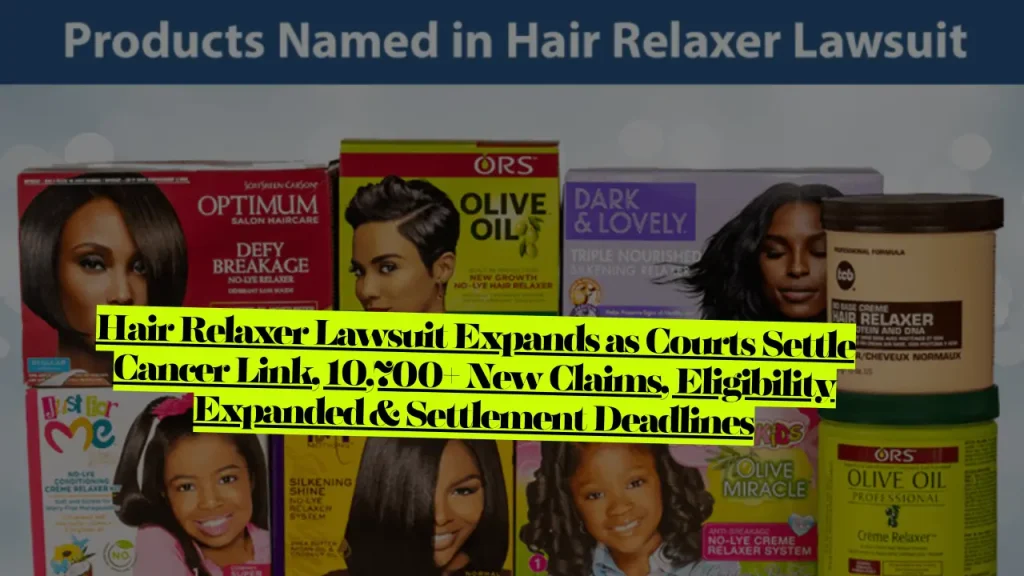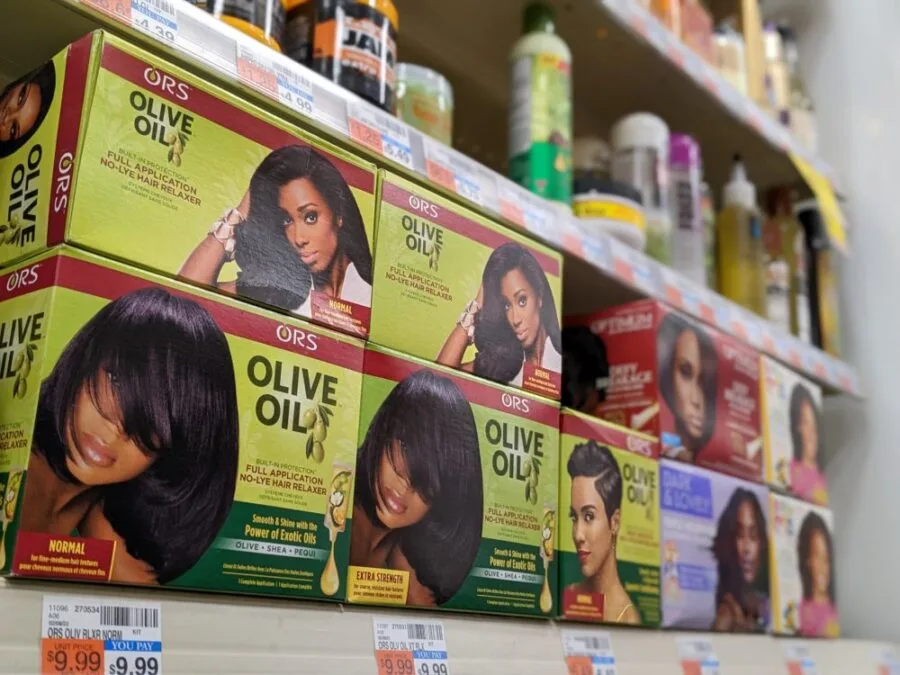Hair Relaxer Lawsuit Expands as Courts Settle Cancer Link, 10,700+ New Claims, Eligibility Expanded & Settlement Deadlines
The latest hair relaxer lawsuit updates: Over 10,700 lawsuits now allege that major hair relaxer manufacturers failed to warn women—primarily Black women—about serious health risks, including uterine, ovarian, and endometrial cancers, endometriosis, and fibroids. In October 2025, a landmark Georgia Supreme Court ruling expanded consumer rights, enabling more women with repeated hair relaxer use to pursue claims. Affected individuals may still file for substantial compensation, but critical deadlines and new evidence standards make it urgent to review your eligibility and act now.
What Are the Latest Hair Relaxer Lawsuit Updates?
- Case count surges: As of November 2025, over 10,700 cases are pending in federal multidistrict litigation (MDL), with a steady influx of new claims.
- Recent court victories: The Georgia Supreme Court ruled on October 15, 2025, that each hair relaxer product purchase starts its own 10-year claims window, allowing many women—especially those with long-term use—to file lawsuits that were previously time-barred.
- Science at center stage: “Science Day” in January 2026 will see expert testimony on whether hair relaxer chemicals cause reproductive cancers; this may directly impact settlement leverage.
- Test trials scheduled: Initial bellwether trials are set for late 2026–2027, expected to influence national settlement offers and compensation amounts.
What Does the Hair Relaxer Lawsuit Allege?
- Core allegations: Multinational brands like L’Oréal, Revlon, Strength of Nature, and others knowingly marketed products containing toxic chemicals (including phthalates and endocrine disruptors) linked to hormone-related illnesses.
- Manufacturers failed to warn: Claims argue companies concealed cancer risks and withheld health warnings from consumers, despite mounting scientific evidence and studies published in top medical journals.
- Injuries covered: Lawsuits focus on:
- Uterine, ovarian, and endometrial cancer
- Uterine fibroids, requiring surgery (often hysterectomy)
- Endometriosis and major hormone disruption
- Economic losses, lost wages, and non-economic harm
Who Can Claim Hair Relaxer Lawsuit Funds?
You may qualify if you:
- Are a woman diagnosed with uterine, ovarian, or endometrial cancer, fibroids, or endometriosis after using chemical hair relaxers
- Used hair relaxer products regularly (e.g., five or more times per year) and/or over several years before your diagnosis
- Still fall within the statute of limitations (timing differs by state, but Georgia now counts each product purchase as a new clock)
- Are a family member of someone who passed away from these illnesses (wrongful death claim)
Related lawsuit: Cash App Lawsuit Settlement Cash App Money Going Out Now, Did You Miss Your $2,500 Payout Deadline?

What Evidence Is Needed to Prove Eligibility?
- Medical records confirming diagnosis and type of cancer or disease
- Details on frequency, duration, and brands of hair relaxer products used (receipts, packaging, or witness statements helpful but not required)
- Any supporting documentation showing lost wages, medical expenses, and impact on daily life for higher compensation claims
What Compensation Is Available from the Lawsuit?
Compensation categories may include:
- Medical costs: Past, current, and future treatment for diagnosed cancers or related conditions
- Lost income and future earning losses
- Pain, suffering, permanent disability, and loss of normal life
- Wrongful death damages for families
- Potential punitive damages for corporate misconduct
- Estimated settlements: Individual settlements could range from $100,000 to $2 million+, depending on diagnosis, longevity of exposure, and life impact, with cancer claims at the high end.
What Is the Current Status of the Hair Relaxer Lawsuit?
- MDL progress: Over 10,700 active cases; Philadelphia and Georgia courts also handling consolidated lawsuits.
- Bellwether trials: The first jury trials, critical for setting benchmark settlement amounts, are scheduled for late 2026 and early 2027.
- Settlement talks ongoing: A special settlement mediator has been appointed, but large-scale settlements are unlikely until test trial outcomes emerge.
- Dismissal of non-compliant cases: Courts are strictly enforcing evidence and procedural deadlines; cases missing required fact sheets or documentation risk dismissal, highlighting the urgency of proper filing.
What Is the Deadline to File a Hair Relaxer Lawsuit Claim?
- Statute of limitations: Varies by state and diagnosis, but recent court rulings (Georgia, October 2025) clarify that each product purchase starts a new 10-year deadline. If diagnosed within the past several years, it is urgent to seek legal consultation and protect your legal rights.
- Upcoming cutoff: Plaintiffs in ongoing lawsuits must submit complete fact sheets and documentation—missed deadlines may bar your ability to claim.
How Do You File a Hair Relaxer Lawsuit Claim?
To start your claim:
- Gather medical records, diagnosis details, and hair relaxer product history.
- Document exposure (brands, frequency/years of use, and age at first use).
- Contact an attorney experienced in hair relaxer litigation (many offer free evaluations).
- Submit detailed information (required in the plaintiff fact sheet).
- Meet filing deadlines for ongoing MDL or state court cases.
Insider tip: Providing receipts, photos of product packaging, or testimonies from those who saw you use relaxers strengthens your claim and possible payout.
What Recent Legal Developments Affect the Lawsuit?
- Georgia Supreme Court ruling: Allows more women with repeated relaxer use to pursue claims, even if they started products decades ago.
- Federal case management: Courts are tightening deadlines for discovery, documentation, and evidence production.
- Expert disclosures: Both plaintiffs and defendants now preparing to present scientific evidence linking—or contesting—the connection between relaxers and reproductive cancers, a pivotal moment for future settlement talks.
- State and federal court consolidation: Parallel lawsuits in Pennsylvania, Georgia, and Illinois courts allow for state-specific claims and potentially expedited trial schedules.
What Makes a Valid Hair Relaxer Lawsuit Claim?
- Personal or family diagnosis (uterine, ovarian, endometrial cancer, fibroids, endometriosis) after regular use of chemical relaxers
- Evidence linking the use of named products to diagnosis
- Lawsuit filed within the statute of limitations, with all required documentation properly submitted
- Compliance with court deadlines (fact sheet, medical records, and required disclosures)

FAQs: Hair Relaxer Lawsuit 2025
1. What are the latest hair relaxer lawsuit updates?
Over 10,700 lawsuits are active nationwide, with court decisions expanding eligibility and “Science Day” set to weigh key cancer-risk evidence in early 2026.
2. What cancers and diseases qualify for settlement funds?
Uterine, ovarian, and endometrial cancers, fibroids (requiring surgery), endometriosis, and hormone disruption qualify.
3. Can you file if it’s been more than 10 years since your first use?
Yes, per the 2025 Georgia Supreme Court ruling, each product purchase starts its own deadline.
4. What evidence is required to file a valid claim?
Medical diagnosis, history of hair relaxer use, receipts, product packaging, and any documentation of economic or non-economic impact.
5. What is the current settlement status?
No global settlement yet—test cases beginning in late 2026 will likely drive negotiations.
6. How do you get started with a claim?
Contact an experienced attorney, gather your evidence, and act quickly to protect your rights.
7. Where can I find official court documents and claim procedures?
See the Georgia Supreme Court ruling here and federal MDL updates (Northern District of Illinois, Hair Relaxer MDL 3060).
About the Author

Sarah Klein, JD, is a licensed attorney and legal content strategist with over 12 years of experience across civil, criminal, family, and regulatory law. At All About Lawyer, she covers a wide range of legal topics — from high-profile lawsuits and courtroom stories to state traffic laws and everyday legal questions — all with a focus on accuracy, clarity, and public understanding.
Her writing blends real legal insight with plain-English explanations, helping readers stay informed and legally aware.
Read more about Sarah
